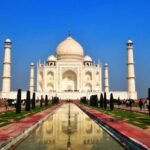India is blessed with spectacular monuments that give insights into the country’s diverse traditions, complex history, and remarkable architectural capabilities. Some of the Important monuments of India stand as testaments to the nation’s rich heritage, spanning thousands of years of civilisation.
These architectural marvels showcase not only India’s cultural evolution but also its technological prowess and artistic mastery across different historical periods.
In this article, we explore some of the most important monuments of India and their cultural significance, examining how they have shaped the nation’s identity and continue to draw admirers from around the world.
| Monument | Location | Built |
|---|---|---|
| Taj Mahal | Agra, Uttar Pradesh | 1632 – 1653 |
| Hampi Monuments | Hampi, Karnataka | 1336 – 1570 CE |
| Red Fort | Delhi | 1639 – 1648 |
| India Gate | Delhi | 1921 |
| Konark Sun Temple | Konark, Odisha | 13th century CE |
| Golden Temple | Amritsar, Punjab | 1581 – 1604 |
| Sanchi Stupa | Sanchi Town, Madhya Pradesh | 3rd century BCE |
| Brihadeeswarar Temple | Thanjavur, Tamil Nadu | 1010 AD |
| Gateway of India | Mumbai | 1911 |
| Elephanta Caves | Elephanta Island, Mumbai | Mid-5th – 6th century AD |
| Ajanta Caves | Aurangabad, Maharashtra | 2nd century BCE |
| Qutb Minar | Delhi | 1192 – 1220 |
| Jaisalmer Fort | Jaisalmer, Rajasthan | 1155 AD |
| Hawa Mahal | Jaipur, Rajasthan | 1799 |
| Ellora Caves | Aurangabad, Maharashtra | 6th – 10th century CE |
| Meenakshi Amman Temple | Madurai, Tamil Nadu | 6th century BCE |
| Mahabalipuram Shore Temple | Mahabalipuram, Tamil Nadu | 725 AD |
| Mysore Palace | Mysore, Karnataka | 1897 |
| Mahabodhi Temple | Bodh Gaya, Bihar | 260 BC |
| Khajuraho Temples | Khajuraho, Madhya Pradesh | 885 – 1000 CE |
| Laxmi Vilas Palace | Vadodara, Gujarat | 1890 |
| Victoria Terminus | Mumbai | 1887 |
| Victoria Memorial | Kolkata | 1906 |
| Charminar | Hyderabad | 1591 |
| Agra Fort | Agra, Uttar Pradesh | 16th century |
| Humayun’s Tomb | Delhi | 1560 |
| Basilica of Bom Jesus | Old Goa | Late 16th century |
1. Taj Mahal
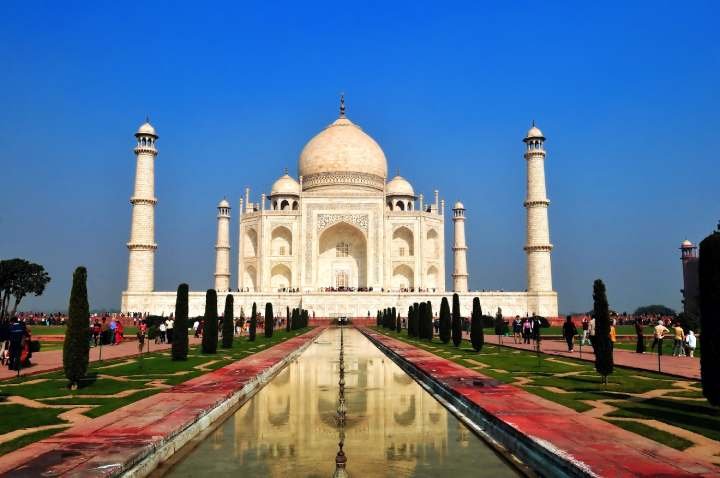
Regarded as a symbol of love, the Taj Mahal is one of India’s most iconic monuments, built by Mughal Emperor Shah Jahan to house the tomb of his beloved wife, Mumtaz.
Location: Agra, Uttar Pradesh
Built: 1632 – 1653
2. Hampi Monuments
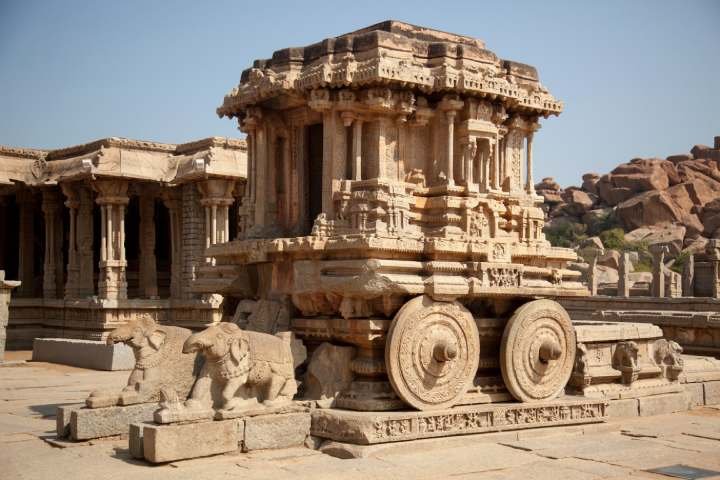
Hampi, once the capital of the Vijayanagar Empire, features vast ruins with stone temples, palaces, and markets. Highlights include the 7th-century Virupaksha Temple and the iconic stone chariot carving at Vittala Temple.
Several monuments of the Hampi ruins are recognised as UNESCO World Heritage sites.
Location: Hampi, Karnataka
Built: 1336 – 1570 CE
3. Red Fort
The historic Mughal fort in Old Delhi, built by Emperor Shah Jahan in the 17th century when he moved the capital from Agra, serves as a national symbol where the Prime Minister hoists the Indian flag on Independence Day.
Location: Delhi
Built: 1639-1648
4. India Gate
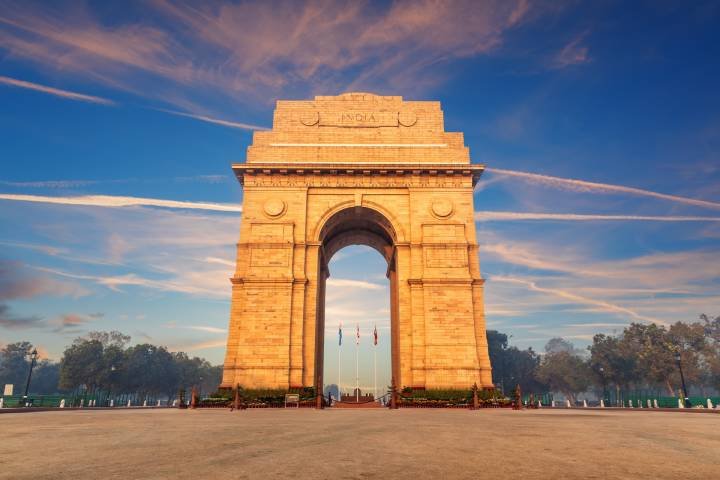
A Majestic war memorial arch is located near Rajpath in New Delhi. It was built as a memory honouring 70,000 Indian soldiers who died in WWI, features an eternal flame and stands amid sprawling lawns.
Location: Delhi
Built: 1921
5. Konark Sun Temple
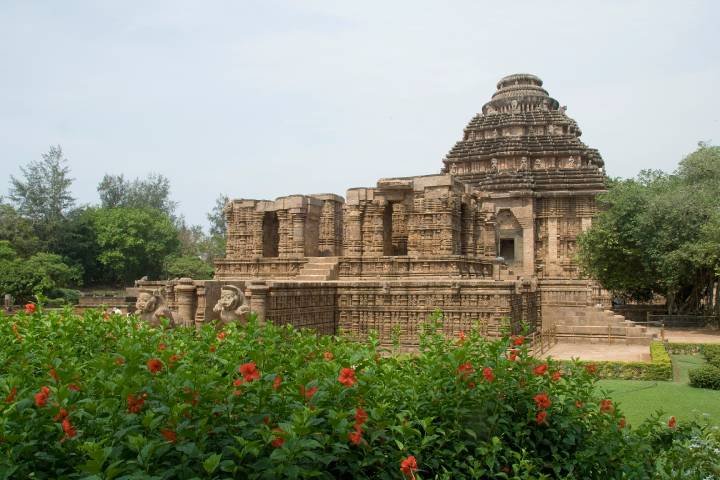
The Konark Temple is one of the important monuments of India, built during the 13th century.
Shaped like a giant chariot with twelve pairs of carved wheels, it is dedicated to the Sun God Surya. This famous temple shows the rich art and culture of ancient India.
Location: Konark, Odisha
Built: 13th CE
6. Golden Temple
Also known as Sri Harmandir Sahib, it is a magnificent gold-plated gurdwara located in the middle of a sacred pool in Amritsar city. It is one of the holiest places of the Sikh community. It holds a Spiritual centre with a community kitchen serving thousands daily, regardless of faith
It stands as a Symbol of spiritual equality, service and community.
Location: Amritsar, Punjab
Built:1581-1604
7. Sanchi Stupa
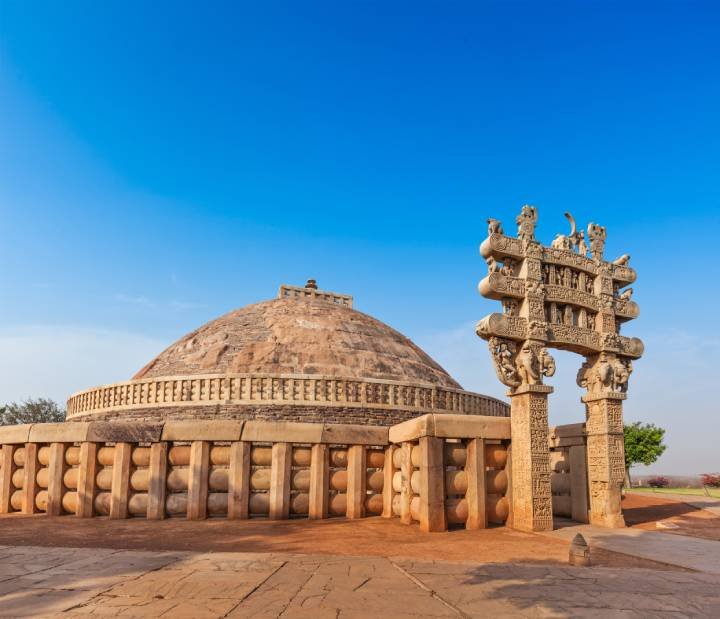
Sanchi Stupa, an ancient Buddhist monument built by Emperor Ashoka in the 3rd century BCE, features grand stone gateways intricately carved with scenes from Buddha’s life and Jataka tales.
It is one of India’s oldest stone structures and a UNESCO World Heritage site.
Location: Sanchi Town, Madhya Pradesh
Built: 3rd BCE
8. Brihadeeswarar Temple
One of the ‘Great living Chola Temples’, Brihadeeswarar is a magnificent 1000-year-old Lord Shiva temple built under the Cholan empire in Thanjavur.
It features a 216 feet vimana (temple tower) crowned by an immense single stone weighing around 80 tons.
The temple is renowned for its remarkable engineering prowess and has been designated a UNESCO World Heritage Site.
Location: Thanjavur, Tamil Nadu
Built: 1010 AD
9. Gateway of India
The Iconic basalt arch monument on Mumbai’s harbour was built during the British Raj to commemorate King George V’s 1911 visit to India.
Location: Mumbai
Built: 1911
10. Elephanta Caves
A collection of ancient rock-cut cave temples dedicated to God Shiva is located on Elephanta Island near Mumbai.
They feature remarkable Hindu sculptures, the famous one being a triple-headed Shiva statue (Maheshmurti) representing three aspects of Shiva as the Creator, the Preserver and the Destroyer.
Location: Elephant Island, Mumbai
Built: mid-5th – 6th century AD
11. Ajanta Caves
Buddhist rock-cut cave monuments are famous for their magnificent mural paintings and sculptures dating from the 2nd century BCE. They were discovered by a British officer in 1819
Location: Aurangabad, Maharashtra
12. Qutb Minar
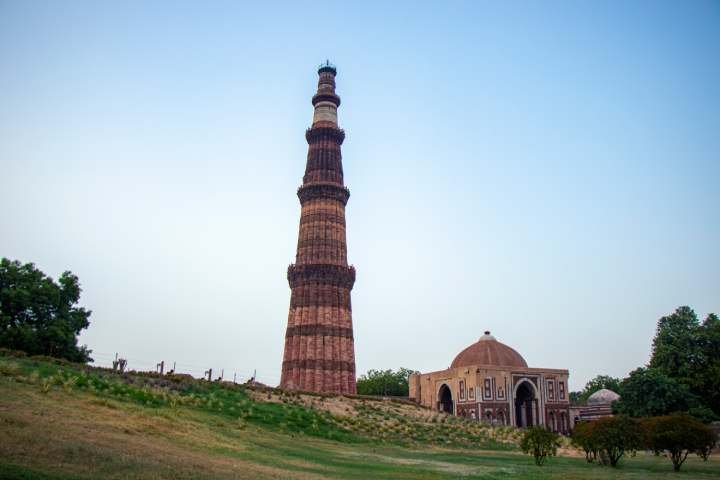
Qutb Minar, a UNESCO World Heritage Site, is the tallest brick minaret and a symbol of victory located in Old Delhi. Built in the 12th century, it showcases exquisite Indo-Islamic architecture and reflects the grandeur of the Delhi Sultanate.
Location: Delhi
Built: 1192-1220
13. Jaisalmer Fort
Massive sandstone fortress located in the city of Jaisalmer in the state of Rajasthan, nicknamed “Golden Fort” for its honey gold colour.
It is one of the very few forts in the world that still houses palaces, temples, and residential quarters within its walls.
Location: Jaisalmer, Rajasthan
Built: 1155 AD
14. Hawa Mahal
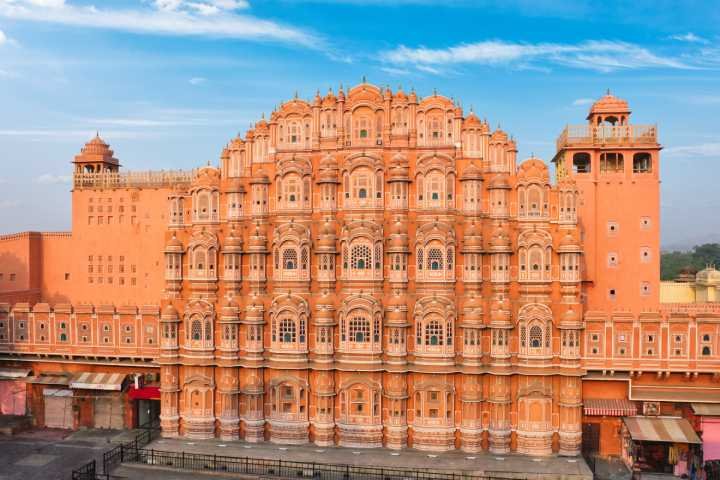
A magnificent palace located in Jaipur city. It is popularly called as “Palace of Winds” having over 953 small windows called as jharokhas, designed to allow royal women to observe festivals while remaining unseen.
Location: Jaipur, Rajasthan
Built: 1799
15. Ellora Caves
A rock-cut multi-religious cave complex featuring Buddhist, Hindu, and Jain monuments, highlighted by Kailasa Temple.
It is popular as one of the largest rock-carved monastic temple complexes in the world.
Location: Aurangabad, Maharashtra
Built: 6th – 10th CE
16. Meenakshi Amman Temple
A Colossal Dravidian temple complex in Madurai with 14 magnificent gopurams, dedicated to Goddess Meenakshi.
Location: Madurai, Tamil Nadu
Built: 6th BC
17. Mahabalipuram Shore Temple
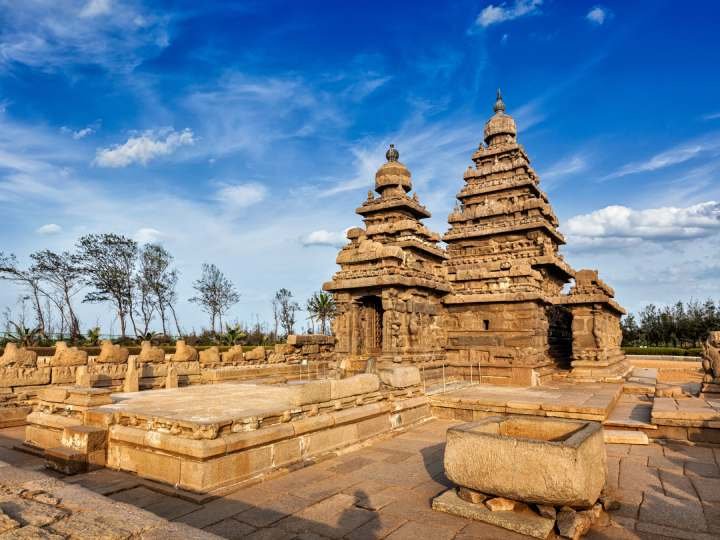
Located along the Bay of Bengal, the Shore Temple in Mahabalipuram is a complex of temples and shrines built during the Pallava dynasty.
The temple reflects early Dravidian architecture. Carved from granite, it features remarkable stone sculptures that tell stories of mythology and devotion, making it a UNESCO World Heritage site and a symbol of India’s rich cultural heritage.
Location: Mahabalipuram, Tamil Nadu
Built: 725 AD
18. Mysore Palace
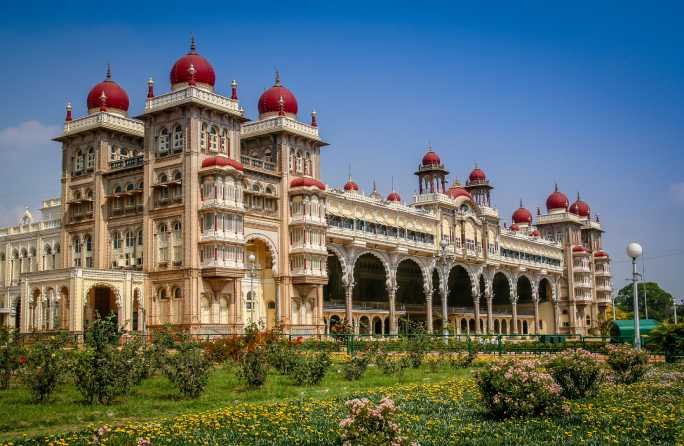
Also known as Amba Vilas Palace, Mysore Palace is the royal residence of the Wadiyar dynasty. Renowned for its Indo-Saracenic architecture, carved wooden doors, and gilded Durbar Hall, it drew over 3.9 million visitors in 2024–2025, making it one of the important monuments of India.
Location: Mysore, Karnataka
Built: 1897
19. Mahabodhi Temple
The Mahabodhi Temple in Bodh Gaya, where Buddha attained enlightenment, is one of the oldest Buddhist temples. Featuring a pyramid-like structure with an ornate spire, it’s a UNESCO World Heritage site and attracts millions of pilgrims and visitors from around the world each year.
Location: Bodh Gaya, Bihar
Built: 260 BC
20. Khajuraho Temples
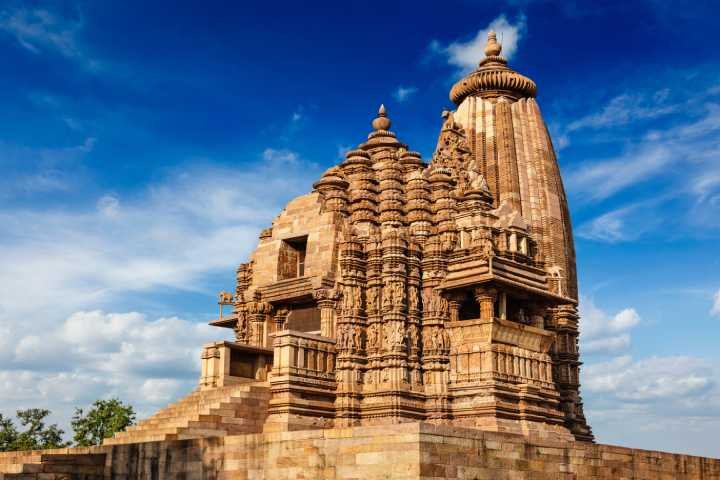
The Khajraho group of Monuments are a group of Hindu and Jain medieval temples renowned for exquisite stone carvings depicting daily life, mythology, and erotic scenes with remarkable artistic detail.
Location: Khajuraho, Madhya Pradesh
Built: 885 – 1000 CE
21. Laxmi Vilas Palace
Built by Maharaja Sayajirao Gaekwad III in 1890, the Laxmi Vilas Palace is the grand residence of Vadodara’s royal family.
It is four times the size of Buckingham Palace. Spanning 500 acres, it blends Indo-Saracenic architecture with modern amenities and European-style gardens, and remains one of India’s largest and most opulent private palaces.
Location: Vadodara, Gujarat
Built: 1890
22. Victoria Terminus
The famous Railway station of Mumbai. Popular for its Victorian Gothic style architecture blended with Indian palace design. Today, this monument is renamed to Chhatrapati Shivaji Terminus. It was listed as a UNESCO World Heritage Site in 2004.
Location: Mumbai
Built: 1887
23. Victoria Memorial, Kolkata
Victoria Memorial in Kolkata is a majestic white marble museum built in honour of Queen Victoria. Blending British and Mughal architecture, it houses rare artefacts and paintings. Surrounded by lush gardens, it’s a major cultural landmark and a symbol of colonial-era grandeur
Location: Kolkata
Built: 1906
24. Charminar
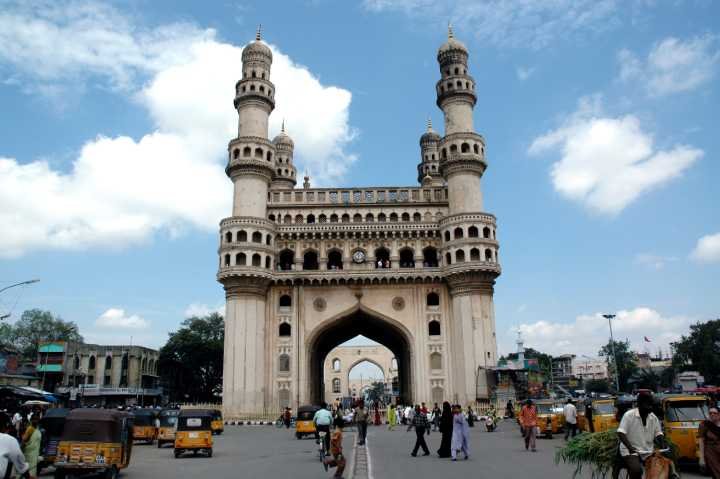
The iconic symbol of Hyderabad, Charminar, was built in 1591 by Sultan Quli Qutb Shah. Located in the heart of the city, it features four grand minarets. A popular belief is that it was built to mark the end of a plague. Today, it’s surrounded by vibrant pearl and bangle markets.
Location: Hyderabad, Telangana
Built: 1591
25. Agra Fort
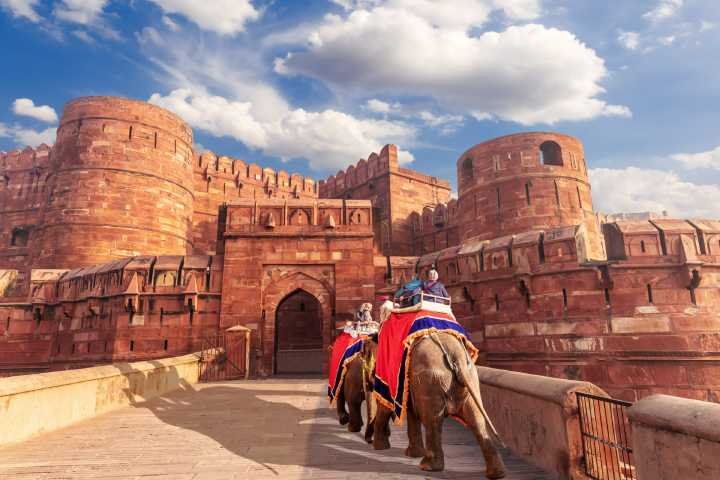
Also known as ‘Lal-Qila’, it is a historic fort that also served as the main residence of Mughal emperors. It was also listed as a UNESCO World Heritage site.
Location: Agra, Uttar Pradesh
Built: 16th century
26. Humayun Tomb
The Tomb of Humayun, situated in Delhi, is the first garden tomb in the Indian subcontinent. It stands as a testament to Mughal design and was designated a UNESCO World Heritage Site in 1993, highlighting its historical and cultural significance.
Location: Delhi
Built: 1560
27. Basilica of Bom Jesus
The Basilica of Bom Jesus, a renowned Roman Catholic church in Old Goa, is renowned for its stunning Baroque architecture and exquisite marble flooring.
Built in Renaissance style, it houses the mortal remains of Saint Francis Xavier, making it a major pilgrimage site and an important symbol of Goa’s colonial history.
Location: Goa
Built: 1594
A few other notable monuments of India
28. Lotus Temple
Located in New Delhi, the Lotus Temple is famous for its unique, lotus-like architecture. This Baháʼí House of Worship is open to all faiths, symbolising unity and purity.
Location: New Delhi
Built: 1986
29. Rani ki Vav
An ancient stepwell intricately designed in the Maru-Gurjara architectural style. This UNESCO World Heritage Site is one of India’s most important monuments, renowned for its exquisite sculptures of deities and mythological figures.
Location: Patan, Gujarat
Built: 1063
30. Gol Gumbaz
The 17th-century mausoleum located in Bijapur, Karnataka, is the tomb of Mohammed Adil Shah. It boasts the world’s second-largest unsupported dome and is an Important monument of India
A special attraction of this structure is its central chamber, where every sound is echoed seven times.
Location: Bijapur, Karnataka
Built: 1659
31. Amber Fort
Amber Fort, situated on a hill near Jaipur, Rajasthan, is renowned for its Hindu architectural elements, intricate mirror work, and breathtaking views. It is a major tourist attraction in the region.
Location: Amer, Rajasthan
Built: 1592
32. Chittorgarh Fort
Also known as Chittod Fort, it was once the capital of Mewar. It is one of the largest forts in India and is listed as a UNESCO World Heritage site. There are several brave stories and tales of Rajput bravery and their sacrifice around this fort. It features numerous palaces, temples, and towers within its massive walls.
Location: Chittorgarh, Rajasthan
Built: 7th Century AD
33. Tawang Monastery
The largest Buddhist monastery in India and the second largest in the world, it is located in Tawang, Arunachal Pradesh. It is a prominent centre for Buddhist learning and culture.
Location: Tawang, Arunachal Pradesh
Built: 1680 – 1681
34. Nalanda University Ruins
Nalanda University ruins were established in the 5th century CE in ancient Magadha (now Bihar). It was a large Buddhist monastery and a major centre of learning from the 5th to the 12th century.
Location: Nalanda, Bihar
Built: 427 CE
35. Thousand Pillar Temple
The Thousand Pillar Temple, located in Hanamkonda, Telangana, is a historic Hindu temple dedicated to Lord Shiva, also known as Rudreswara Swamy.
Renowned for its exquisite Kakatiyan architectural style, the temple features intricately carved pillars that showcase remarkable craftsmanship and artistry.
Location: Hanamakonda
Built: 12th Century
36. Gomateshwar Statue
The Gomateshwar statue, a 42 feet monolithic sculpture of Lord Bahubali, was carved in 1432 AD and is located in Shravanabelagola, Karnataka. Symbolising peace and renunciation, it attracts pilgrims and tourists from around the world.
Location: Shravanabelagola, Karnataka
Built: 981 CE
37. Martand Sun Temple in Anantnag
The ancient Martanda Sun Temple, dedicated to Lord Surya, is located in Anantnag, Jammu and Kashmir. It was constructed in the 8th century AD during the reign of Lalitaditya Muktapida of the Karkotaka Dynasty. Built using black stone, the temple showcases the architectural prowess of medieval Indian civilisation with its magnificent brilliance.
Location: Anantnag, Kashmir Valley
Built: 8th Century AD.


